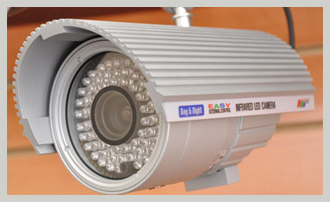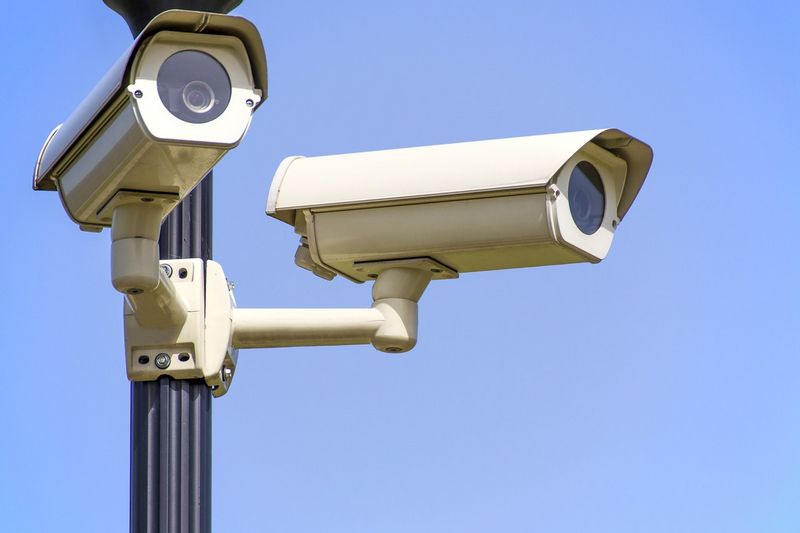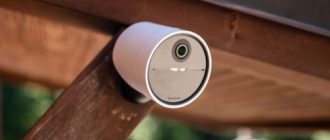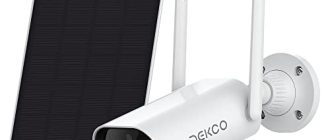
Do home security cameras prevent crime
When it comes to crime prevention, security measures play a crucial role in keeping our homes and loved ones safe. In recent years, home security cameras have gained popularity as an effective deterrent against burglaries and other criminal activities. But do these cameras truly prevent crime, or are they simply an added expense without any real benefits?
Surveillance cameras have been proven to be a valuable tool in deterring criminal behavior. The presence of cameras can discourage potential criminals from targeting a home, as they do not want to be caught on film or identified later. In fact, studies have shown that homes equipped with security cameras are less likely to be targeted by burglars.
Home security cameras provide homeowners with a sense of control and peace of mind. Being able to monitor their property remotely through smartphone apps or computer software allows homeowners to keep an eye on their surroundings even when they are away. This added layer of security not only helps in preventing crimes, but also aids in capturing evidence in case an incident does occur.
It is important to note that having security cameras alone may not be enough to prevent all crimes. They should be used in conjunction with other security measures, such as alarm systems and proper lighting, to create a comprehensive security plan. Additionally, it is crucial to place the cameras strategically to maximize their effectiveness. Visible cameras in areas such as the front door, back yard, and garage can serve as a strong deterrent for potential criminals.
In conclusion, home security cameras are a powerful tool in preventing crime. While they may not guarantee complete immunity from criminal activities, their presence alone can significantly reduce the likelihood of a break-in. By investing in a reliable security camera system and implementing other security measures, homeowners can take proactive steps towards protecting their homes and creating a safer environment for their families.
Importance of Home Security Cameras
Home security cameras play a crucial role in preventing crime and providing protection for your home. The presence of cameras can act as a deterrent to potential criminals, as they are less likely to target a property that has visible surveillance.
Cameras are a valuable tool for capturing evidence in the event of a crime taking place. The footage recorded by these cameras can be used by law enforcement to identify and apprehend perpetrators, as well as provide evidence for prosecution.
In addition to preventing crime and aiding in investigations, home security cameras also offer peace of mind for homeowners. Being able to monitor your property remotely allows you to keep an eye on your home and loved ones, even when you are not physically present. This added sense of security can help reduce stress and anxiety about the safety of your home.
Furthermore, home security cameras can also serve as a visual record of any incidents that occur on or near your property. This can be helpful in cases of accidents, disputes, or even unexpected events such as wildlife encounters.
Overall, the installation of home security cameras is a proactive step that homeowners can take to protect their property and prevent crime. The presence of cameras serves as a deterrent, aids in investigations, and provides peace of mind. By investing in this technology, homeowners can create a safer environment for themselves and their families.
Types of Home Security Cameras
There are several types of home security cameras available in the market that help homeowners protect their property and prevent crime. Here are some popular types of security cameras:
Outdoor Security Cameras: These cameras are specifically designed to withstand harsh weather conditions and are usually placed outside the house to monitor the surrounding areas. They provide a wide field of view and often have night vision capabilities, making them ideal for monitoring the exterior of a home for potential threats.
Indoor Security Cameras: These cameras are typically placed inside the house to monitor the interior spaces, such as living rooms, bedrooms, or hallways. They can be used to keep an eye on babysitters, housekeepers, or any suspicious activity inside the home. Indoor security cameras come in various shapes and sizes, and some are designed to be hidden for discreet surveillance.
Wireless Security Cameras: As the name suggests, these cameras do not require any physical cables to connect to the monitoring system. They use Wi-Fi technology to transmit video footage to a central recording device or a smartphone app. Wireless security cameras offer flexibility in terms of installation and can be easily moved or relocated if needed.
IP Cameras: IP (Internet Protocol) cameras are a type of digital surveillance camera that can send and receive data via a computer network and the internet. They are known for their high-resolution video quality, remote access capabilities, and advanced features such as motion detection and two-way audio communication. IP cameras can be accessed and controlled from anywhere with an internet connection, making them a popular choice for homeowners looking for convenient monitoring options.
PTZ Cameras: PTZ (Pan-Tilt-Zoom) cameras are motorized cameras that can pan (move horizontally), tilt (move vertically), and zoom in and out. They offer a wide range of coverage and can be controlled remotely to follow any suspicious activity. PTZ cameras are commonly used in larger properties or commercial settings where a single camera can cover a larger area.
Dummy Security Cameras: These cameras are not functional but are designed to resemble real security cameras. They are often used as a deterrent to potential criminals, as they give the illusion of surveillance. While dummy cameras do not provide actual security, they can help create a perception of being monitored and discourage criminal activities.
It is important to choose the right type of home security cameras based on your specific needs and the areas you want to monitor. By installing security cameras, homeowners can have peace of mind knowing that they are taking proactive steps to protect their home and deter crime.
Benefits of Home Security Cameras
Home security cameras offer several important benefits when it comes to protecting your property and deterring crime. By installing security cameras in and around your home, you can enjoy increased peace of mind and have the ability to monitor your property even when you are away.
One of the primary benefits of home security cameras is that they provide a visual deterrent to potential criminals. When criminals see visible security cameras, they are less likely to target your home due to the risk of getting caught on camera. This can significantly reduce the chances of a break-in or other criminal activity.
Additionally, security cameras can provide valuable evidence in the event of a crime. If a crime does occur despite the presence of security cameras, the footage captured by the cameras can be used by law enforcement to identify and apprehend the culprits. This can greatly increase the chances of recovering stolen property and bringing the criminals to justice.
Moreover, home security cameras allow homeowners to monitor their property in real time. With the advancement of technology, many security cameras can be accessed remotely through mobile apps, allowing homeowners to view live video feeds and receive notifications of any suspicious activity. This provides a sense of control and enables homeowners to take immediate action if necessary.
In addition to deterring crime and providing evidence, home security cameras can also be beneficial for insurance purposes. Some insurance companies offer discounts on home insurance premiums for homeowners who have security systems in place, including security cameras. By investing in home security cameras, homeowners can potentially save money on their insurance while increasing the safety of their property.
In conclusion, home security cameras offer numerous benefits when it comes to securing your home and reducing the risk of crime. From acting as a visual deterrent to providing valuable evidence and allowing remote monitoring, security cameras can significantly enhance the security of your home and provide you with peace of mind.
Effectiveness of Home Security Cameras
Home security cameras are an important tool in preventing and deterring crime. These cameras provide homeowners with a sense of security and peace of mind, knowing that their property is being monitored and any suspicious activity will be captured on video.
Studies have shown that the mere presence of security cameras can act as a deterrent for criminals. When potential burglars or intruders see an active surveillance camera, they are less likely to target that home or property. This is because they know that their actions will be recorded and their identification may be easier for law enforcement to obtain.
In addition to deterring crime, home security cameras can also provide valuable evidence in the event of a break-in or other criminal activity. The captured video footage can be used by law enforcement to identify and apprehend suspects, as well as serve as evidence in court proceedings.
Furthermore, home security cameras can also help homeowners monitor their property remotely. With modern technology, homeowners can access live video feeds from their cameras through their smartphones or computers. This allows them to check on their home and receive real-time alerts if any unusual activity is detected.
While home security cameras are not foolproof and cannot completely eliminate the risk of crime, they are proven to be an effective deterrent and surveillance tool. Their presence alone can significantly reduce the likelihood of a home being targeted by criminals. Investing in a reliable home security camera system is a worthwhile investment for homeowners looking to protect their property and the safety of their loved ones.
Factors to Consider when Installing Home Security Cameras
When it comes to protecting your home and preventing crime, installing security cameras can be a wise decision. However, it is important to consider certain factors before installing home security cameras to ensure their effectiveness.
Here are some key factors to consider:
- Placement: Proper placement of cameras is crucial to their effectiveness. You should strategically place cameras in areas that are vulnerable to break-ins, such as entry points and blind spots. Additionally, consider the angle and field of view of the cameras to maximize their coverage.
- Resolution: The resolution of the cameras determines the clarity of the footage. High-resolution cameras are recommended to capture clear and detailed images, which can aid in identifying suspects in case of a crime.
- Outdoor vs. Indoor Cameras: Depending on your security needs, you may need to install both outdoor and indoor cameras. Outdoor cameras should be able to withstand different weather conditions, while indoor cameras may require features that prioritize privacy.
- Connectivity: Ensure that the cameras are connected to a reliable and secure network. This will allow you to access the live feed and recorded footage remotely through your smartphone or computer.
- Storage: Consider the storage options for the recorded footage. Cloud storage allows for easy access and backup, but it may come with a monthly fee. Alternatively, you can opt for local storage using a hard drive or a memory card.
- Privacy and Legal Considerations: Before installing security cameras, familiarize yourself with local privacy laws and regulations. Ensure that your cameras are not infringing on the privacy of your neighbors or violating any privacy laws.
By considering these factors, you can make informed decisions when installing home security cameras. Remember, the effectiveness of security cameras in preventing crime depends on proper placement, high resolution, appropriate connectivity, suitable storage options, and compliance with privacy laws.
Tips for Choosing the Right Home Security Cameras
When it comes to home security, choosing the right cameras is an essential step in preventing crime. With a wide variety of options available on the market, it’s important to consider your specific needs and preferences. Here are some tips to help you make the right choice:
- Consider your home’s layout: Assess your home’s layout to determine the number of cameras you need. Do you need indoor cameras, outdoor cameras, or both? Identify the areas where you want to install cameras and take note of any blind spots or vulnerable entry points.
- Determine the desired features: Decide on the features you want your cameras to have. These may include night vision, motion detection, two-way audio, and high-resolution video. Think about what is most important for your home security needs.
- Choose between wired and wireless: Consider whether you prefer wired or wireless cameras. Wired cameras generally require professional installation and offer a more stable and reliable connection, while wireless cameras provide flexibility in terms of placement and are easier to install.
- Look for weather resistance: If you are considering outdoor cameras, ensure they are weather-resistant or specifically designed for outdoor use. This will help protect them from the elements and ensure durability throughout different seasons.
- Check for remote access: Look for cameras that offer remote access capabilities. This allows you to view live footage and receive alerts on your smartphone or computer, providing peace of mind even when you’re away from home.
- Consider storage options: Decide how you want to store your camera footage. Some cameras offer cloud storage options, while others may require a separate storage device. Consider the storage capacity and whether you prefer automatic or manual recording.
- Read reviews and compare prices: Before making a final decision, read reviews from other customers to get an idea of the camera’s performance and reliability. Additionally, compare prices from different brands and retailers to ensure you’re getting the best value for your money.
By taking these tips into consideration, you can choose the right home security cameras that meet your needs and help prevent crime. Remember, investing in a reliable and effective security system is an important step in ensuring the safety and security of your home.
How Home Security Cameras Deter Criminals
Home security cameras play a crucial role in deterring crime and protecting your home. These cameras are designed to prevent criminal activity by acting as a visible deterrent to potential burglars and criminals.
When a criminal sees a home with security cameras, they are likely to think twice before attempting to break in. The presence of cameras increases the risk of being caught, as the footage can be used as evidence against them in court.
Home security cameras also provide homeowners with peace of mind and a sense of security. Knowing that you have an extra layer of protection can help reduce anxiety and fear of crime.
In addition to discouraging burglars, home security cameras can also help prevent other crimes, such as vandalism or package theft. The sight of a camera can deter potential vandals from damaging your property or stealing your packages.
Furthermore, home security cameras can help law enforcement solve crimes and identify suspects. If a crime is committed in your area, the footage captured by your camera could be crucial in catching the perpetrator.
Overall, home security cameras are an effective tool for preventing crime and protecting your home. Their presence alone can discourage criminals from targeting your property, and the evidence they capture can lead to the apprehension and conviction of criminals.
Statistics on Home Security Camera Usage
Crime rates have been a growing concern for homeowners, leading many to invest in home security cameras. The rise in popularity of these cameras is largely attributed to their effectiveness in deterring crime and providing evidence in criminal investigations.
According to recent statistics, the use of home security cameras has increased significantly in the past decade. In fact, studies show that approximately 67% of homeowners in the United States have installed some form of home security cameras.
These cameras are commonly used for various purposes, including monitoring the exterior of the property, keeping an eye on children or pets, and deterring potential burglars. The presence of security cameras alone has been found to reduce the likelihood of a crime taking place, as criminals are less likely to target homes with visible cameras.
In addition to their preventive function, home security cameras also play a crucial role in solving crimes. Law enforcement agencies often rely on video footage captured by these cameras to identify suspects and gather evidence. In fact, studies indicate that home security camera footage has played a key role in solving a significant number of crimes.
Moreover, the advancements in technology have made home security cameras more accessible and affordable. With the introduction of wireless cameras and cloud storage options, homeowners can now easily set up and manage their home security systems, providing them with a greater sense of security.
In conclusion, statistics clearly demonstrate the widespread usage and effectiveness of home security cameras in preventing crime. By acting as a visual deterrent and providing valuable evidence, these cameras greatly contribute to enhancing the security of homes and neighborhoods.
Real-Life Examples of Home Security Cameras Preventing Crime
Home security cameras have become an essential tool in deterring crime and protecting properties. Numerous real-life examples demonstrate the effectiveness of these surveillance systems in preventing criminal activities.
- In one incident, a homeowner’s security camera captured a burglar attempting to break into the house. The footage, which was shared with the local police, helped identify and apprehend the suspect. The presence of the security camera alone acted as a deterrent, as the potential robber was aware of its existence.
- Another homeowner reported that the installation of security cameras on their property significantly reduced vandalism. When their surveillance cameras were visible, acts of graffiti and property damage decreased, illustrating the deterrent effect they have on potential offenders.
- A home security camera also played a crucial role in solving a hit-and-run case. The camera footage captured the vehicle’s license plate, enabling law enforcement to identify and apprehend the driver responsible for the incident.
- In another instance, a homeowner’s security camera system alerted them to a suspicious individual approaching their front door. The homeowner was able to view the live footage and promptly call the police, preventing a potential home invasion.
These examples highlight the positive impact of home security cameras in preventing crime. The ability to monitor activities, provide evidence, and act as a visible deterrent make these cameras an effective tool in protecting homes and deterring would-be criminals.
Common Misconceptions about Home Security Cameras
When it comes to crime prevention, many people believe that having security cameras installed in and around their homes is a foolproof solution. However, there are several common misconceptions about home security cameras that need to be addressed.
| Misconception #1: | Home security cameras can eliminate crime completely. |
| Reality: | While home security cameras can deter potential criminals and help catch them after the fact, they cannot completely eliminate crime. Criminals may still try to break into a home, especially if they believe they can avoid detection. |
| Misconception #2: | All home security cameras are the same. |
| Reality: | There are various types and models of home security cameras available in the market, each with different features and capabilities. It is important to choose the right camera that suits your specific needs and provides the desired level of security. |
| Misconception #3: | Home security cameras invade privacy. |
| Reality: | While some people may have concerns about privacy when it comes to home security cameras, it is important to note that these cameras are typically installed in public areas, such as the front door or backyard. Additionally, many cameras offer privacy features, such as motion detection zones, to respect the privacy of occupants. |
| Misconception #4: | Home security cameras are too expensive. |
| Reality: | While some home security cameras can be costly, there are also affordable options available in the market. The cost of a camera depends on its features, resolution, and brand. It is possible to find a home security camera that fits within your budget without compromising on quality. |
| Misconception #5: | Home security cameras require professional installation. |
| Reality: | Many home security cameras are designed for easy installation and can be set up by homeowners themselves. They often come with user-friendly instructions and support. However, if you are unsure or prefer professional assistance, there are services available that offer installation and setup. |
It is important to have a clear understanding of home security cameras and their limitations in order to make informed decisions about home security. While they can be an effective deterrent against crime, it is also important to consider other security measures and to create a comprehensive security plan for your home.
Do Home Security Cameras Violate Privacy?
While home security cameras are designed to prevent crime and increase the safety of your household, there is an ongoing debate about whether they also violate privacy.
On one hand, these cameras can be seen as an invasion of personal space, as they have the potential to capture private moments and activities within the confines of your home. This raises concerns about the misuse of recorded footage and the potential for unauthorized access to this sensitive information.
However, it is important to note that the primary purpose of home security cameras is to deter crime and provide evidence in case of an incident. They are meant to protect your property and ensure the safety of your loved ones.
There are measures you can take to mitigate privacy concerns associated with home security cameras. For example, it is crucial to inform all residents and visitors that cameras are installed, and ensure that their locations are clearly marked. Additionally, it is important to secure the camera feeds with strong passwords and encryption to prevent unauthorized access.
In conclusion, while home security cameras can be seen as an invasion of privacy, their main purpose is to prevent crime and protect your home. By taking appropriate measures to address privacy concerns, you can strike a balance between enhancing security and respecting personal privacy.
Can Home Security Camera Footage Be Used as Evidence in Court?
Home security cameras have become increasingly popular in recent years as a way for homeowners to protect their property and deter crime. These cameras are often equipped with advanced technology that allows them to capture high-quality footage, which can be crucial in identifying suspects and providing evidence in criminal cases.
But can this footage actually be used as evidence in a court of law? The answer is yes. In many jurisdictions, home security camera footage is admissible as evidence in court, as long as certain conditions are met.
First and foremost, the footage must be relevant to the case at hand. This means that it must have a direct bearing on the events that took place and the individuals involved. Additionally, the footage must be properly authenticated to ensure that it has not been tampered with or altered in any way.
Furthermore, the person who recorded the footage may be required to testify in court to authenticate the video. This can involve confirming the date and time the video was captured, as well as providing any necessary context or additional information.
It’s worth noting that while home security camera footage can be a valuable tool in criminal investigations, it is not always a guarantee of conviction. Other factors such as witness testimony, physical evidence, and the credibility of the defense may also come into play.
Overall, home security cameras can provide a significant layer of protection for homeowners and assist in deterring and solving crimes. However, it is important to understand the limitations and legal requirements associated with using this footage as evidence in court. Consulting with legal professionals can ensure that the proper procedures are followed and increase the chances of a successful outcome in a criminal case.
Are Home Security Cameras Vulnerable to Hacking?
When it comes to the security of our homes, technology has provided us with new tools to protect ourselves and deter crime. Home security cameras have become increasingly popular as a way to monitor our properties and keep an eye on any suspicious activity. However, with the rise of smart homes and interconnected devices, concerns about the vulnerability of these cameras to hacking have also emerged.
While security cameras themselves are designed to prevent crime by acting as a visible deterrent, they can also become targets for hackers. Many home security cameras rely on an internet connection to transmit and store footage, and this connectivity can make them vulnerable to external attacks. Hackers may try to gain access to the camera system in order to disable it, tamper with the footage, or even use it for their own malicious purposes.
Thankfully, there are steps that homeowners can take to minimize the risk of their security cameras being hacked. First and foremost, it’s important to choose a reputable brand and model that has built-in security features. Regularly updating the camera’s firmware and using strong, unique passwords can also help protect against unauthorized access.
Additionally, it’s crucial to secure the network that the cameras are connected to. This can include using a strong password for the Wi-Fi network, enabling encryption, and regularly monitoring the network for any suspicious activity. Keeping the cameras’ software up to date and disabling any unnecessary features can also help reduce the potential attack surface.
While no security system is completely foolproof, taking these precautions can significantly mitigate the risk of home security cameras being hacked. By remaining vigilant and staying informed about the latest security practices, homeowners can continue to enjoy the peace of mind that comes with having security cameras installed in their homes.
Q&A:
How effective are home security cameras at preventing crime?
Home security cameras can be an effective deterrent against crime. Studies have shown that the mere presence of visible surveillance cameras can make potential burglars think twice before attempting a break-in. However, it is important to note that security cameras cannot guarantee the prevention of all crimes.
What are the benefits of installing home security cameras?
There are several benefits to installing home security cameras. Firstly, they can help deter potential burglars and criminals from targeting your home. Additionally, security cameras provide evidence in case a crime does occur, which can aid in the identification and prosecution of the perpetrators. Moreover, security cameras give homeowners peace of mind by allowing them to monitor their property remotely.
Can visible security cameras alone prevent all types of crimes?
No, visible security cameras alone cannot prevent all types of crimes. While they can deter opportunistic burglars and vandals, determined criminals who are familiar with security systems might find a way to bypass or disable them. This is why it is important for homeowners to use security cameras in conjunction with other security measures, such as alarm systems and good lighting.
Are there any studies that prove the effectiveness of home security cameras?
Yes, there have been several studies conducted on the effectiveness of home security cameras in preventing crime. One study conducted by the University of North Carolina found that the presence of outdoor security cameras led to a significant decrease in crime rates in the surrounding area. Another study by Rutgers University showed that security cameras were effective in deterring burglaries and increasing apprehensions of criminals.
Can security cameras provide evidence for insurance claims?
Yes, security cameras can provide valuable evidence for insurance claims. If a crime occurs on your property, such as a theft or vandalism, the footage captured by security cameras can be used to support your insurance claim and increase the chances of a successful payout. It is important to ensure that your security camera system has good video quality and that the footage is properly stored.
Are home security cameras effective in preventing crime?
Yes, home security cameras can be effective in preventing crime. Studies have shown that the presence of security cameras acts as a deterrent for criminals. When potential burglars see cameras in place, they are less likely to target a particular property for fear of being caught on tape. Additionally, security cameras can provide valuable evidence in the event of a crime, aiding law enforcement in identifying and apprehending the culprits.
Do home security cameras increase the chances of catching criminals?
Yes, home security cameras increase the chances of catching criminals. With cameras installed, there is a higher likelihood of capturing footage of any criminal activity that occurs. This footage can then be used by law enforcement to identify and apprehend the culprits. In many cases, the presence of security cameras alone is enough to deter criminals from targeting a property, as they do not want to take the risk of being caught on tape.







